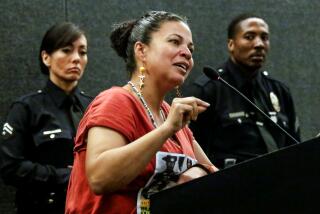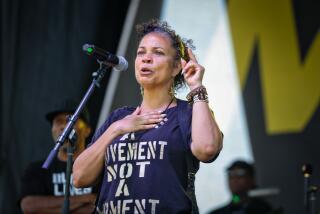Man Who Taped King Beating Defends LAPD
- Share via
George Holliday knew he was guilty of speeding when he was pulled over by the police, but that’s not what had him worried. Would they recognize him after all these years, and if so, how would he be treated?
As it turned out, his fears were unfounded. Not only were the patrol officers civil, but as one handed over the ticket, he acknowledged Holliday’s role in the furor over the 1991 Rodney G. King beating and even told him: “By the way, we think you did the right thing.”
Holliday’s encounter, of course, stands in stark contrast to the experience of King, the speeding motorist whose clubbing by police was recorded by Holliday on his home video camera. Broadcast around the world, the video segment changed the course of Los Angeles law enforcement history.
Holliday, the tall, unassuming general manager of a Sylmar plumbing company, has returned to his regular life. He never quit his job, never got rich, did get divorced, and has remarried.
Right now, he doesn’t even own a video camera.
Though he sometimes still wonders why the officers treated King as they did on the early morning of March 3, 1991--an unsavory slice of police life captured from the balcony of his Lake View Terrace apartment--Holliday said he believes the Los Angeles Police Department got a raw deal.
“I feel bad for the Police Department,” he said last week. “I think that beating was out of line, but I’ve never had a bad experience with them. . . . I don’t think they’re that bad.”
Holliday went on to say that the entire department was unfairly tarnished by the actions of a few officers, two of whom were convicted in federal court of violating King’s civil rights.
In fact, Holliday says he sometimes watches reality-based television shows in which police officers often make arrests under trying circumstances. At those times, he said, he wonders how officers restrain themselves.
Still, the soft-spoken man says he doesn’t understand violence. His style is so nonconfrontational that he let his first wife keep his scrapbook of press clippings from the King incident.
*
He has a few reminders of his own, though. A plaque from the Los Angeles County Board of Supervisors and, of course, a copy of the tape. The original remains a part of the historical record, on file in federal archives.
He has paid off some bills with the relatively modest proceeds he reaped from the incident--including $500 he received the day after the incident from KTLA-TV, Channel 5, where Holliday first took the tape.
He did not, however, succeed in his efforts to sue--for $100 million--several television networks for copyright infringement. And other money-making ventures, mostly put together by lawyers long gone, have been put to rest.
All told, he says he made less than $10,000 on the nine-minute videotape, though he believes that he would have made more had he known more about the broadcasting business.
“I didn’t make the recording to make money but after the whole thing blew up, we all realized there was money to be made,” Holliday said.
He promoted a video called “Shoot News and Make Money With Your Camcorder” for a royalty. He gave permission to a rap music band to use a portion of the taped beating in its music video. He also received an undisclosed fee from filmmaker Spike Lee, who used scenes from the video in his movie “Malcolm X.”
But mostly, the tape served as a free and essential piece of evidence in two trials.
*
Holliday says he feels no responsibility for the events that unfolded after the beating, including the riots in 1992. Racial tensions already had been simmering, he said, and “anything” could have sparked the fires, looting and violence.
“If my tape hadn’t been there, I think something else would have triggered it.”
But as fate would have it, it was his tape that set in motion an extraordinary time in the city’s history. Holliday, who had given the video camera to his first wife for Valentine’s Day, had been playing with it earlier in the evening, trying to figure out the focusing mechanism, among other things.
When he awoke in the middle of the night to the sounds of sirens, helicopters and screeching brakes, Holliday says he instinctively grabbed the camera.
He pulled on some pants, forgot his shirt, and stood shivering on his balcony, filming. When King was subdued and in handcuffs and the police were gone, Holliday watched the tape with his wife. They were dumbfounded.
In the morning, they called the LAPD’s Foothill police station, which patrols the northeast San Fernando Valley, and asked what had happened. Holliday says the desk officer hung up on him.
It was later in the day when he decided to take the tape to Channel 5--especially to reporter Stan Chambers, whom Holliday watched in the evenings--to find out what really took place.
Chambers came to Holliday’s apartment and interviewed the couple. Later, the videotape was broadcast by CNN and fed to stations around the country, Holliday said.
“We called all our friends and said, ‘We’re going to be on TV tonight,’ ” Holliday recalled. “We were disappointed. They used my voice as they were showing the tape, but they didn’t show us.”
It didn’t take long, however, before Holliday became a celebrity. Networks sent camera crews to his doorstep, and major publications sought interviews. He also appeared on television talk shows.
But by the time he met his second wife, his notoriety had waned to the point where he had to tell her who he was.
There was one man, though, about three years ago, who instantly recognized Holliday at a Valley gas station. Rodney King shook Holliday’s hand and said, “ ‘I just want to thank you. You saved my life.’ ”
More to Read
Sign up for Essential California
The most important California stories and recommendations in your inbox every morning.
You may occasionally receive promotional content from the Los Angeles Times.













